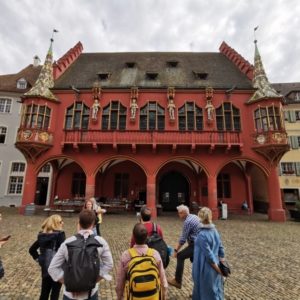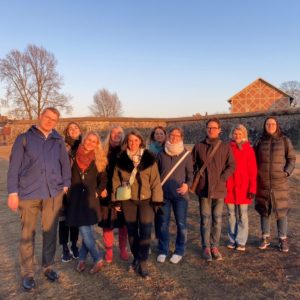Material
Enhancing coherence in teacher education through a European teacher perspective
Information
Name of the institution(s) or teams
- NETT DEVISE KA 2 project
- Prof. Dr. Anna Turula, Pedagogical University Krakow
Format
Virtual Training, organised on a Moodle platform
Title
Train the trainer: Program for designing and implementing Virtual Exchange
Keywords
virtual exchange; VE; teacher training; MOOC; mentoring scheme; intercultural communication
Topic
- Virtual Exchange: planning, design, implementation, evaluation
- Designing VE tasks and task sequences
- Responding to challenge
- VE student mentoring
- Intercultural communication and ICC (intercultural communicative competence)
Goals
To train academic teachers in the planning, design and implementation of virtual exchange programs with special regard to the design of tasks / task sequences which develop higher order thinking skills and intercultural communicative competence.
Domains/aspects of internationalization (fill in the category from the grid)
Groups of students from different countries work together in a virtual classroom and create common projects, which are presented during the course.
Target group
Academic staff; PhD students
Educational level and study year
PhD and post doc levels
Context information users would need to understand the digital tool
(e.g., about the TE system, curricular integration)
The tool used is a Moodle-based course together with various apps (e.g. Padlet). No special content knowledge necessary.
Language of the example
English
License
Copyright
In how far does your approach strengthen the internationalization (of the curriculum) in Teacher Education?
This training aims at making faculty of different universities more familiar with virtual exchange as a means of internationalisation. It gives the know-how of virtual exchange together with the philosophy of such pedagogy, its rationale and ICC-connected outcomes, the latter being even more important for internationalisation.
Which dimensions of digital transformation in teaching for teacher educators did you incorporate (utilize)?
- digital competencies (use digital tools and resources effectively in your teaching practice),
- digital pedagogy (integration of digital tools and resources into teaching and learning strategies, including the development of new approaches, methods and techniques),
- digital assessment: use of digital tools and techniques to assess and evaluate learning
- digital infrastructure (the provision of digital infrastructure and resources to support teaching and learning).
- digital literacy: tech-savvy task-tool affordancing
How have you utilized digital tools/methods/resources in your teaching practice to strengthen coherent/integrative and/or international approaches, and what specific strategies or techniques have you found to be effective in achieving this objective?
For example the use of digital tools and resources, such as virtual exchanges with students from other countries, could enhance the international and cross-cultural dimensions of a learning experience. Additionally, good task-tool affordancing as well as innovative, ICC-oriented task design guarantee the development of higher-order thinking skills. Finally, virtual exchanges provide excellent context for various learning modes – individual, local group, international group – which cater to various learner needs and individual differences.
How have you employed co-creative approaches and/or participatory design in your use of digital tools to enhance student learning and engagement, and what have been some of the successful outcomes that you have observed as a result?
Virtual exchange is a mode of learning in which students work in teams – local or international. VE task design capitalises on this learning mode: most assignments are about the co-creation of a certain outcome which is subject to future processing (international peer evaluation and constructive feedback; re-design; implementation by the partner group, etc.).
Download
Download/watch Video
(MP4)
Download/watch video
DownloadEvents: ConnEcTEd
Blog: ConnEcTEd
Es gibt derzeit noch keine Beiträge in dieser Kategorie.

Reisebericht: ConnEcTEd Project Meeting in Zagreb
Ein zentrales Anliegen der School of Education FACE ist die Entwicklung kohärenter – also strukturell und inhaltlich sinnhaft zusammenhängender – Curricula oder Module im Rahmen des Lehramtsstudiums. Was liegt da in Zeiten der Globalisierung näher, als sich anzusehen, wie dieses Prinzip in anderen Staaten und Bildungssystemen umgesetzt wird? Im Rahmen des Projekts ConnEcTEd geschieht genau das. Im September dieses Jahres reiste eine Freiburger Delegation nach Zagreb, um sich dort gemeinsam mit Projektpartner*innen aus Oslo, Nizza, Helsinki und Zagreb in Präsenz zu diesem wichtigen Thema auszutauschen.

Ins Bächle „dappen“, oder nicht? Treffen des ConnEcTEd-Teams in Freiburg
After the first in-person-meeting in March in Oslo, the ConnEcTED-Team met for the second time in Freiburg im Breisgau at the end of May. In the „Green City“ on the western edge of the Black Forest, right on the border to Switzerland and France, the project members reported on their work, discussed new tasks and further steps in the project, as well as forms of collaboration in different IOs.

Reisebericht: Das ConnEcTEd-Team in Oslo
Ein zentrales Anliegen der School of Education FACE ist die Entwicklung kohärenter – also strukturell und inhaltlich sinnhaft zusammenhängender – Curricula oder Module im Rahmen des Lehramtsstudiums. Was liegt da in Zeiten der Globalisierung näher, als sich anzusehen, wie dieses Prinzip in anderen Staaten und Bildungssystemen umgesetzt wird? Im Rahmen des Projekts ConnEcTEd geschieht genau das. Ende März dieses Jahres reiste eine Freiburger Delegation nach Oslo, um sich dort in Präsenz zu diesem wichtigen Thema auszutauschen.
Funding
This project receives funding from the Erasmus+ programme of the European Union (Strategic Partnerships, KA 203).
The contents of this website and the view expressed in the news and publications are the sole responsibility of the authors and under no circumstances can be regarded as reflecting the position of the European Union.




